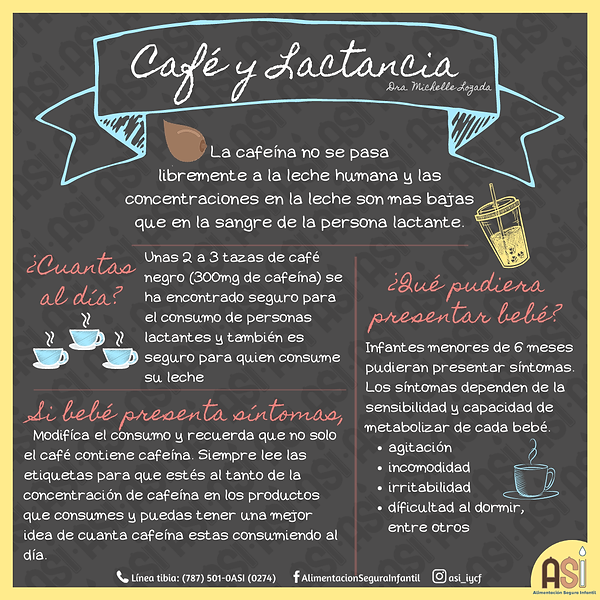ALIMENTACIÓN SEGURA INFANTIL
Coffee and Lactation

Coffee and breastfeeding or chestfeeding
Whether it's culturally, for pleasure, or simply because you need it to get through the day, a cup of coffee is probably part of your routine.In Puerto Rico, the estimated annual coffee consumption is 10 pounds per person (2016-2017). If you are part of these coffee consumption statistics and you are also a breastfeeding or chestfeeding person or plan to be, we invite you to keep reading to find out that breastfeeding or chestfeeding is not an impediment to enjoying a cup of coffee.
Moderate caffeine consumption by the breastfeeding or chestfeeding person usually has no consequences for infants consuming their milk. About 2 to 3 cups of 8 oz black coffee (300mg of caffeine) have been found to be safe for breastfeeding or chestfeeding individuals, and it is also safe for the baby consuming their milk. However, there is literature suggesting that infants under 6 months are more likely to show some symptoms.
Symptoms in infants commonly depend on how sensitive they are to caffeine and how quickly they metabolize it. Some of these symptoms that may occur are:
-
Agitation
-
Discomfort
-
Irritability
-
Trouble sleeping, among others.
It is recommended to be attentive to the signs and adjust consumption if necessary.
Studies have shown that caffeine does not pass freely into human milk, and concentrations in milk are lower than in the breastfeeding or chestfeeding person's blood. Peak concentrations occur 1 hour after consuming caffeine-containing products.
The amount of caffeine that reaches human milk is approximately 1% of what the breastfeeding or chestfeeding person consumes, and some studies have found that a breastfeeding or chestfeeding infant would have to consume 25 liters of human milk (from a person who has consumed caffeine) just at the peak of concentration to obtain the approximate caffeine content present in a cup of coffee.
It's essential to note that not only coffee contains caffeine; always read labels to be aware of the caffeine concentration in the products you consume and to have a better idea of how much caffeine you are consuming per day.
Caffeine content in beverages and foods:
-
Espresso coffee: 145 mg/50 mL shot
-
Black coffee: 96mg/1 cup (8oz)
-
Caffeinated/energy drinks: up to 80 mg/250 mL per can
-
Instant coffee (1 tsp/cup): 60–80 mg/250mL per cup
-
Tea: 10–50 mg/250mL per cup black tea, green tea, Matcha, herbal tea
-
Soft drinks/Sodas: up to 54 mg/375 mL cup
-
Chocolate bar (milk chocolate): 20 mg/100 g per bar
Remember; moderation is key!
Information compiled and written by: Dr. Michelle Lozada Martínez
References:
[https://estadisticas.pr/…/tablas-de-consumo-de-alimentos] [https://pubmed.ncbi.nlm.nih.gov/507903/] [https://pubmed.ncbi.nlm.nih.gov/7098450/] [https://www.breastfeeding.asn.au/…/breastfeeding-and…]
Lauwers, J. & Swisher, A. (2015). Counseling the Nursing Mother: A Lactation Consultant's Guide. Burlington, MA: Jones & Bartlett Learning. Mohrbacher, N. (2010).
Breastfeeding answers made simple: a pocket guide for helping mothers. Amarillo, TX: Hale Publishing [https://www.llli.org/breastfeeding-info/caffeine/] [https://kellymom.com/bf/can-i-breastfeed/lifestyle/caffeine/] [https://www.cdc.gov/…/diet-and…/maternal-diet.html] [https://www.consumerreports.org/…/is-there-more…/]

